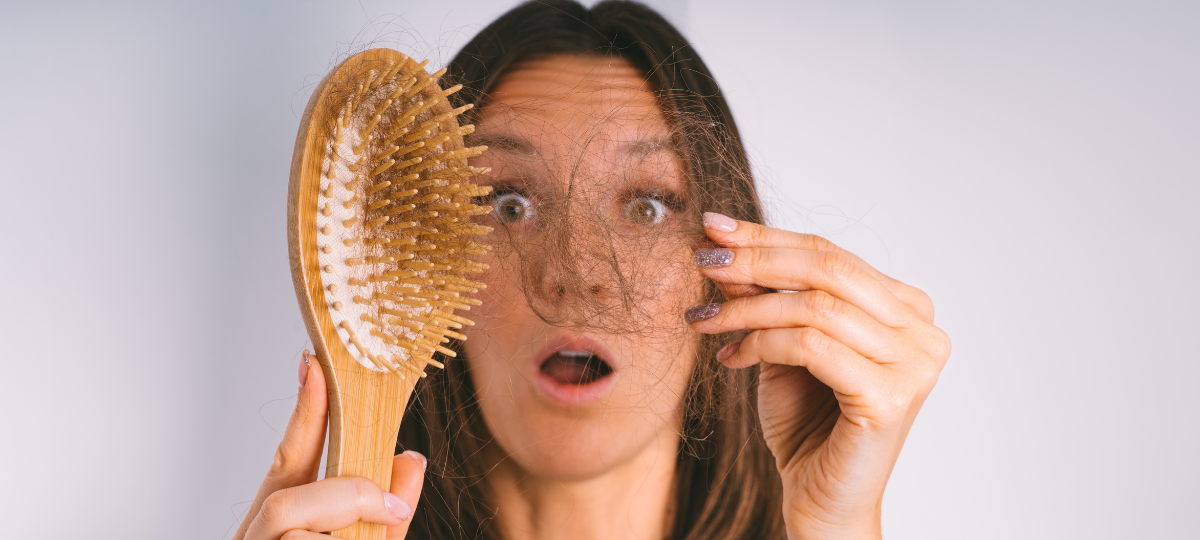Polycystic Ovary Syndrome (PCOS) affects millions of women worldwide, and one of its most distressing symptoms is hair loss. If you’ve noticed your hair thinning, shedding more than usual, or bald patches forming, you’re not alone. Hair loss due to PCOS isn’t just cosmetic—it deeply affects confidence and emotional well-being.
In this article, we’ll explore the underlying causes of PCOS-related hair loss and provide effective, research-backed solutions to help you reclaim your hair and confidence.
What Is PCOS and How Does It Affect Hair?
PCOS is a hormonal disorder that causes the ovaries to produce excess androgens (male hormones). While androgens are naturally present in all women, elevated levels can lead to:
- Irregular periods
- Acne
- Excess facial/body hair
- Scalp hair thinning or loss (androgenic alopecia)
How PCOS Causes Hair Loss:
Excess androgens shrink hair follicles on the scalp, particularly around the crown and temples. This results in shorter hair growth cycles and increased shedding.
Common Signs:
- Thinning hair on the top or crown of the scalp
- Wider part lines
- Increased hair shedding during brushing or showering
Other Contributing Factors to Hair Loss
While PCOS plays a major role, other factors can worsen hair loss:
- Nutrient deficiencies (iron, vitamin D, B12, zinc)
- Chronic stress (raises cortisol, affects hormones)
- Thyroid dysfunction (often coexists with PCOS)
- Insulin resistance (common in PCOS, affects hair health)
- Inflammation (can trigger scalp issues)
Medical Treatments for PCOS Hair Loss
If your hair loss is severe, medical intervention may help balance hormones and slow down shedding.
1. Oral Contraceptives
- Birth control pills help regulate menstrual cycles and lower androgen levels.
- Common brands include Yaz, Diane-35, and Ortho Tri-Cyclen.
2. Anti-Androgens (Spironolactone)
- This prescription drug blocks androgen receptors and reduces their effect on hair follicles.
3. Minoxidil (Rogaine)
- A topical solution FDA-approved for female hair loss.
- Helps prolong the hair growth phase and boost regrowth.
Note: Always consult a gynecologist or dermatologist for personalized treatment.
Natural and Holistic Solutions
For those looking for gentler alternatives, several natural strategies can support hair health from within.
1. Balance Hormones Naturally
- Reduce sugar and refined carbs to lower insulin resistance.
- Eat a hormone-supportive diet rich in fiber, healthy fats, and plant proteins.
- Incorporate adaptogens like spearmint tea, maca, and ashwagandha.
2. Nutrient Support for Hair Regrowth
- Biotin: Supports keratin production.
- Vitamin D: Crucial for follicle cycling.
- Iron: Prevents telogen effluvium (shedding phase).
- Zinc: Reduces inflammation and promotes hair repair.
3. Scalp Massage & Oils
- Use oils like rosemary, peppermint, or castor oil to stimulate circulation.
- Massage your scalp 3-4 times a week for 5–10 minutes.
4. Stress Management
- Practice mindfulness, journaling, or yoga.
- Ensure 7–9 hours of quality sleep nightly.
- Limit caffeine and alcohol intake.
Hair Care Tips for Women with PCOS
- Avoid tight hairstyles (like ponytails) that stress follicles
- Choose sulfate-free, gentle shampoos
- Limit heat styling tools and chemical treatments
- Air dry your hair as often as possible
- Use silk pillowcases to reduce friction
When to Seek Professional Help
If your hair loss is rapid, severe, or emotionally distressing, it’s best to consult a:
- Dermatologist for scalp health and treatments
- Gynecologist or endocrinologist for hormonal evaluation
- Trichologist for specialized hair loss diagnosis and care
Final Thoughts
Hair loss from PCOS can feel overwhelming, but it is manageable. With the right mix of medical care, lifestyle changes, and self-care, you can support hair regrowth and regain your confidence.
Remember, progress may take time. Be kind to yourself and focus on healing both inside and out.
Want more PCOS tips and hair care guides? Subscribe to HeySaheli for expert-backed advice made for women like you.

